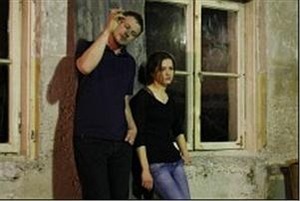IN THE SHADE OF ALGERIA, OR PEOPLE WITHOUT HOMELAND 0
(About the premiere of Kaunas State Drama Theatre, “Return to the Dessert” by Bernard-Marie Koltès)Lina Klusaitė
www.kamane.lt, 2009 02 19
“Love for some city is usually secret” (Albert Camus. “A Summer in Algeria “)
In brief: The creative direction of a young director Artūras Areima, who directed the third performance already, “Return to the Dessert” by Bernard-Marie Koltès at Kaunas State Drama Theatre, is rather symbolic. The motif of a trip encoded in the titles of all three performances expresses the creative searches of the director himself. The titles of the performances “A Trip Inside the Room”, “The Road”, “Return to the Dessert” express a certain direction, movement, process of searches.
The director touched the theme of needlessness of a human being for himself in the first performances “A Trip Inside the Room” by Michail Walczak and “The Road” by Jim Cartwright. Here the artist chose the conditional form of theatre expression, which denies the singleness and completeness of a classical plot. The new performance “Return to the Dessert” changed the former creative principles of the director slightly.
By choosing a rather complicated play by its volume, structure, variety of themes and characters, A.Areima did not expect easy work most probably. The determination to overcome a multilayered work is the artist’s position that is worth respect.
The action of “Return to the Dessert” takes place at the end of the liberation war of Algeria. The playwright solved the problem of colonialism in the context of fight for independence via the story of one family. It was important to him to show how colonisation processes affected human lives. Meanwhile, A.Areima does not try to give too much emphasis of the history of Algeria or topicalities of Lithuania, which testify the signs of the past and present.
The director is inclined to speak about the common experience of people. Making the content of the drama universal, he chooses an abstract minimalistic stage design and concentrates attention on the relations of conflicting people. In the first part of the performance A.Areima focuses on biting dialogues of actors and shows the conflict of two people – brother and sister.
It becomes clear after the first episodes already that the hatred of the brother and sister hides the political dissolution of the family. Matilda acted by Daiva Stubraitė and Adrianas acted by Dainius Svobonas confront like two different armies.
The end of the performance leaves even more questions. A.Areima succeeded to achieve in the first part that episodes would keep the dynamics and rhythm; they would look like a single story without bigger interruptions of action. Meanwhile, everything falls into pieces in the second part. Attention of the audience is lost along with the action.
The author doubts whether it was the aim of the director to turn the performance into an absurd party of chaos. Fatima acted by I.Mikutavičiūtė is recognised a lunatic incidentally, Eduardas acted by S.Čiučelis shoots himself down after a monologue about the acceleration of turning universe. It finally becomes clear that the war of ambition and hatred between the brother and sister is their expression of love (the theme of incest sounds completely unnecessary here). The happiest is Kiki acted by J.Onaitytė, who comes out from this absurd comedy applauding after jockeying everybody.
Perhaps A.Camus was right saying that “everything that inspires to live increases the absurdity of life at the same time“. Is such a “happy ending” projected in the “Return to the Dessert“? The audience leaves the performance puzzled – as if somebody took away the emotional charge which was promised publicly at the beginning.

